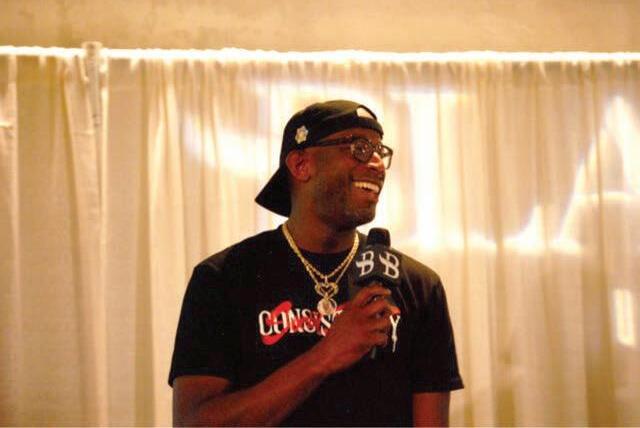
4 minute read
The life and legacy of Denver’s beloved storyteller.
By Christen Aldridge
As a Black person living in Denver, the “six degrees of separation,” phenomenon is common. Families and friends are connected like the roots of a tree. Reflecting on the life of Baba Grimes, I realize the impact he’s had on my life and the lives of others.
Baba Grimes was a true Renaissance man, working in all aspects of theatrical production. My childhood was filled with near-encounters with the man who played an important role in community programs and activities for Denver youth.
As a teenager, I frequently participated in a youth summer camp at Shadow Theater, owned by his good friend, Jeffrey Nichols. From ages 7 to 16, I participated in 4-H programming at Urban Farm, owned by his friend, Khadijah Haynes. Lastly, I will never forget my various story time experiences led by another one of Baba Grimes’ dear friends, Opalanga Pugh.
Like so many of Colorado’s treasured elders, his dedication served as the heartbeat of Denver’s Black community. He instilled wisdom in everyone he encountered and carried on a legacy of greatness through cultural arts.
“We plant the seeds that will grow trees and bear fruit that we will not eat,” community activist, Brother Jeff, recalls, saying that is what Baba Grimes was all about.
A Denver native and Colorado State University alum with an affinity for the arts and nature, his passion and love for Black culture inspired his writing. In addition to working as an English and Theater teacher for Denver Public Schools, he was active in providing leadership for local youth. His commitment to sharing African folktales and his own culturally significant stories earned the title “Baba,” a connotation honoring respected male elders in African communities.
After the passing of his close friend, Baba Grimes assumed Pugh’s role as the community storyteller. He spearheaded the Pa’anga Pugh Children’s Pavilion at the Colorado Black Arts Festival (CBAF), where he carried on her legacy for children in the community. “My kids remember how animated he was and his amazing stories,” says Dana Manyothane, former CBAF Executive Director and niece of the late CBAF Founder and Artistic Director, Perry Ayers.
Members of Baba Grimes’ theater family, Donnie Betts, Jo Burton Keels, Roslyn Washington, and Dwayne Carrington remember life working with the theater titan.
“He was my brother,” Washington describes. “We were like a family, working days and nights together.”
Betts recalls, “He was a very tall, gentle person. A great soul, friend, and theater buddy.”
Baba Grimes worked with Betts on several performances as part of the Black Arts Movement at Eulipion Theater. They also worked together on a production of “Ain’t No Grave,” featuring former Denver Mayor Wellington Webb. “It was a joy working with Ken,” says Betts, discussing his most recent project celebrating
Justina Ford’s 150th birthday at the Colorado History Museum.
Keels remembers her friend’s excitement when his play “Uncle Jab’s Barbershop,” received exposure in New York City. “He was so excited!” she says. “It was great to see him so happy.” In 2015, he shared his hopes that “Uncle Jab’s Barbershop” would change Denver from an importer to an exporter of Black artists.
Actor Dwayne Carrington remembers working with Baba Grimes in “The Meeting,” a production imagining a sit-down between civil rights leaders Rev. Dr. Martin Luther King Jr. and Malcolm X. “He embodied that role so well,” says Carrington, who played Rev. King.
Dave Engleton, who was introduced to Baba Grimes by his then-girlfriend, calls his friend a “Man of the People,” and remembers being hesitant to ask him to serve on the board of directors for his nonprofit, Multicultural Events Network. “I was so nervous. I was praying he would accept the offer.” Engleton later invited Baba Grimes to be a guest facilitator for a writer’s group he created with a few friends from the Lighthouse Writer’s Workshop Novel Writing class, “Humboldt Street.”
The Humboldt Street group welcomed Baba Grimes with open arms. The group was comprised of writers he’d known and worked with for several years, including Jane Treat, Norma Johnson and Susan Kaplan. Even as his disease progressed and he lost the ability to speak, he remained present and active, helping the group with their writing.
“He wrote a piece called ‘Body,’ and it was about what his body was going through with ALS,” says Treat, who helped with transcription when he lost the ability to move his hands.
Baba Ken Grimes received his ALS diagnosis too late after initially being misdiagnosed. Despite relief from finally having answers, his family had difficulty coping with the diagnosis.
“It was frustrating because we missed out on resources to help him early on in the disease,” his son, Troy Grimes says.
Those closest to him are left with pleasant memories of their time together. “He would take us skiing, hiking, and camping,” his brother, Jerry, adds.
Baba Grimes was a devoted father and husband. He was married to his wife, Geraldine “Gerry” Grimes, for 52 years before she passed away in 2022. He is survived by two sons, Troy and Aaron Grimes, 16 grandchildren, and 18 greatgrandchildren.
“Our father made us who we are now,” Aaron says of his devout Christian father. “He thought of himself as a helpful servant to God, and he taught us to be helpful servants in our lives – servants to God while also being helpful to others.”
As Baba Grimes’ closest friends and family share stories about his life, legacy, art and love for the community, I am proud to have such valuable connections with someone so passionate about Denver’s Black community. Still, I am saddened that I did not get to thank him for his love and commitment to the people of Denver, and for honoring our ancestors while empowering the youth.
Thank you, Baba Ken Grimes. We love you and we miss you. May this tribute be a celebration of a life well-lived, as we honor our elder and share his legacy over time. .










